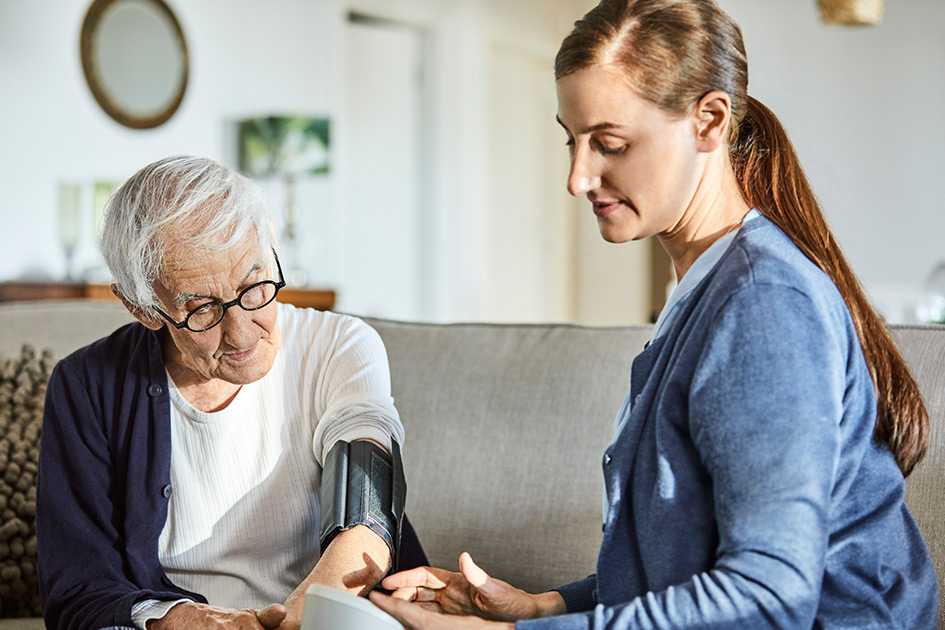Caregiving behind the scenes
There’s a lot of well-deserved attention lately on front-line caregivers. As well there should be. Health care workers are putting forth heroic efforts amidst the backdrop of COVID-19.
But there’s another group of caregivers behind the scenes. They don’t get paid for their efforts. Either physically or emotionally, most are on the job 24/7, with little respite.
Many don’t even recognize themselves as caregivers. They start out by “helping out” a loved one or a friend. Soon their responsibilities grow into something much more.
This group—and it’s a large group—are unsung heroes, simply caring in a way they would appreciate if the circumstances were reversed.
Meet some North Dakota caregivers
In a series of upcoming articles, BCBSND will introduce you to three informal, or unpaid, North Dakota caregivers. You’ll meet:
- Deb, a mom, grandma, accountant and fan of race cars, a passion she shared with her husband until he was left unconscious and immobile from a freak accident. In between working two jobs, Deb cares for her husband at home.
- Janelle, a wife and working mom of three whose busy life includes caring for a son with special needs.
- Marsha, a career woman, wife, stepmom and devoted daughter who manages the affairs of her mother in a care facility.
Unpaid caregiving is common in North Dakota
One out of every five people in North Dakota needs additional care outside the health care system. For each of the five there is at least one family member or friend providing some level of support.
The care comes in many forms. It could be assisting with daily living, managing personal affairs and finances, offering emotional support, or overseeing medical care. In many cases it’s all of the above.
Most caregivers are stacking the demands of caregiving on top of their own responsibilities, often which include full time jobs. One out of every six employees also acts as a caregiver.
Caregiving takes its toll
It’s no wonder caregiving takes its toll. The commitment of time, labor and emotional support can have a substantial impact on caregivers’ physical, behavioral and emotional well-being.
Caregivers are 26 times more likely than the general population to have serious health conditions. That could include anything from increased anxiety and depression to more chronic illness like heart disease and diabetes.
- While caregivers often find solace in “buffers” like family, friends and faith, many also report alcohol, medication and food as coping mechanisms.
- Tobacco use disorder is 42% more prevalent, and hypertension is 64% more prevalent in caregivers.
- Major depression, anxiety, obesity and adjustment disorder are also at the top of the list.
As with most aspects of life, the COVID-19 pandemic exacerbates the demand for and intensity of caregiving in a dramatically altered landscape. Consequently, it has increased self-reported stress, isolation and loneliness among caregivers. A CDC report published in August 2020 reported that 31% of unpaid caregivers reported suicidal ideation in the past 30 days (compared to 3% of the general population).
Get help. Be help.
Based on its prevalence, there’s high probability you know a caregiver or are one yourself.
If you’re the former, keep your radar tuned for neighbors, co-workers or people in your faith community who provide care to others. If a caregiver asks for help, say yes. Consider mentioning specific things you can help with such as a ride to an appointment, mowing the lawn, making and delivering a meal or walking pets. Check in periodically with short, simple yet supportive emails, text messages and/or handwritten notes.
If you’re a caregiver, make your own health a priority so you can continue to help others.
- Consider delegating some of the responsibilities to other family members.
- Request support resources from the medical professionals who care for your loved one.
- Lean on those in your faith community, workplace, neighborhood and extended family.
- Look for signs of caregiver stress (for example, overwhelm, constant worry, sleep issues, weight changes, loss of interest, reliance on substances) and take advantage of a helpline:
- Disaster Distress Helpline – Call 1-800-985-5990 or text TalkWithUs to 66746 to connect with a trained crisis counselor.
- Crisis Text Line – Text HOME to 741741 to text message with a trained crisis counselor.
- National Suicide Prevention Lifeline – If you’re feeling suicidal, call 1-800-273-TALK (8255).
Learn more about health risks associated with caregiving, and resources to help building your own toolkit.
